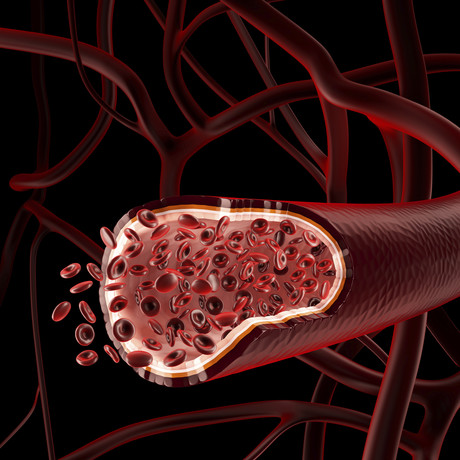'Stiffer' blood vessels may increase risk of heart attack

Research led by Macquarie University has found that blood vessel ‘stiffness’, or distensibility, is an important determinant of blood flow, and may play a role in influencing the fate of Australians living with coronary heart disease.
When blood vessels narrow to significant degrees, patients experience symptoms such as chest pain, with severe narrowing eventually leading to heart attacks. However, there have until now only been a handful of studies that have evaluated the effects of distensibility in patients with heart disease, the true clinical impact of which has never been widely acknowledged.
Seeking to rectify this, Macquarie’s Cardiac Computational Fluid Dynamics Core Laboratory group used in-house methods to generate highly accurate computer models that mimic blood vessels of the heart in real life, enabling them to study how different conditions may affect blood flow. They also studied blood flow within a group of 104 patients with heart disease to validate their findings, with the results published in the journal PLOS ONE.
“Say, hypothetically, two coronary heart disease patients both have the same level of blood vessel narrowings,” said Dr Andy Yong, co-lead author on the study. “It is the one whose vessels were better able to distense, or stretch, that we would expect to have better outcomes, and be less likely to suffer a heart attack. That is a breakthrough finding.”
The study shows that measuring distensibility may be of clinical importance, with patients with stiffer vessels more likely to develop symptoms earlier and suffer heart attacks in the future. The results therefore may change the way we think about risk factors for coronary disease patients and allow for earlier intervention before negative events occur.
“While the participants of the study were all currently living with coronary heart disease, it is the broad-scale potential of these findings beyond just those known to be at risk of disease, in terms of medical intervention techniques, diagnostic options and treatments, that are most exciting,” Dr Yong said.
Retinal health linked to dementia risk, study shows
Researchers have discovered that the blood vessels at the back of the eye — called retinal...
Pancreatic cancer hijacks metabolism switch to help it spread
Pancreatic cancer hijacks a molecule known for regulating physiological processes, such as food...
Novel antibiotic activates 'suicide' mechanism in superbug
Researchers have discovered a new class of antibiotic that selectively targets Neisseria...




